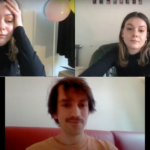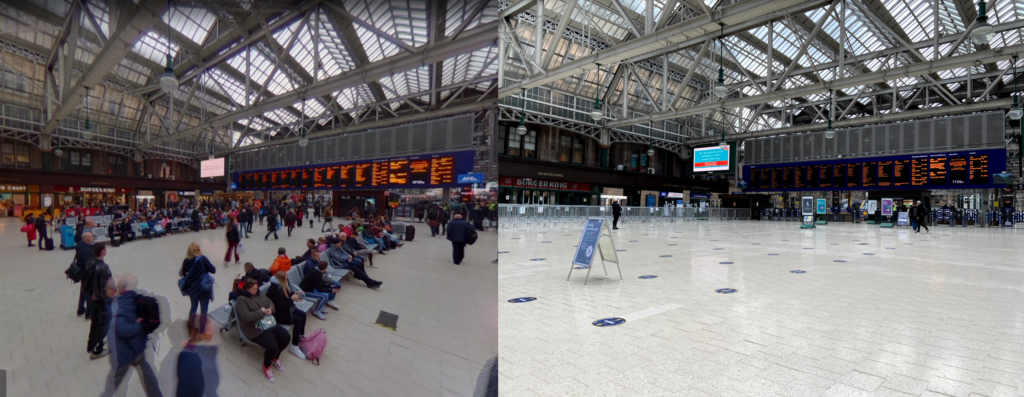
The final post in our Student Undergraduate Award Showcase is a two-hander, as Theatre Studies students Emma Drostby and Christopher Watts’ reflect on their performance piece, ‘Paris, May 1968’. The piece – devised entirely online – approaches COVID-19 through the lens of memory and trauma, and, in the combination of image and soundscape, explores both the personal and collective impact of lockdown.
Content Warning: this performance contains mentions of suicide. We recommend that you read the Programme Notes before watching the piece.
‘Paris, May 1968’ is a performance piece tackling trauma and memory, and the ways in which collective traumas – such as global pandemics – affect our memories and understanding of physical spaces. Our piece approached COVID-19 memory primarily through a sensory experience with soundbites inspired by a Google Earth soundscape created during the first lockdown. We engaged in field work by recording audio clips around Glasgow and pairing them with ‘before’ and ‘after’ visuals of the city. These images, combined with the soundscape, created a simplified sensory tour of Glasgow that showcased the impact that COVID-19 has had on the city and on the people who live here.
The narrative of the piece takes the form of a series of written segments, inspired by and incorporating quotes from our friends about the experience of lockdown up to that point. It takes place in an imagined future where lockdowns had not ceased and new COVID strains were still a looming danger. As well as a narration, the piece was expressed through a Zoom call, one of the many lasting images of the first year of COVID-19 lockdowns. This was of course a decision made when the idea of being locked down for another year and mutating strains seemed utterly ridiculous.

COVID-19 as a subject was chosen because, as two young people experiencing University life amid lockdowns and travel restrictions, it seemed a clear angle to take. Given that the piece was created for a course called ‘Performing Memory’, and COVID is an example of a truly ‘collective’ moment in history – as well as being a challenge to the notion of memory itself – it was a natural starting point for our work. We hoped to create a piece, while specific to our experiences and those of our peers, that could also broadly speak to anyone who had experienced the tedium of lockdowns in the same manner.
The collaborative process was very much linked to the piece itself, as it was conducted entirely in the virtual world with no in-person meetings and all material being shared back and forth online in the devising and editing process. As a result the piece itself is, in its own way, a memory of COVID-19 and the restrictions that were in place throughout our final year.
About Christopher Watt and Emma Drostby
Christopher is a student of Theatre Studies and Film & Television and an occasional writer. He is currently writing a thesis on the role of children in art cinema. He has written and directed several short films and plays.
Emma is a student of Theatre Studies and Italian. Her main interests in theatre are scriptwriting and devising plays. Outside of her degree, she also works behind the scenes with Student Theatre at Glasgow as Backstage Manager.
About this Series
This piece is part of a series celebrating and showcasing the work of the 2020/21 Student Undergraduate Prize winners at the School of Culture and Creative Arts, awarded in recognition of excellence in the diverse and innovative modes of assessment our School offers. Their work captured experiences common to many of us over the last year or so, and inspired us as they explored new ways to be creative with their assessments. Strong themes that come through in these winning entries are isolation, emotions which touch on trauma, and the power of communication.

